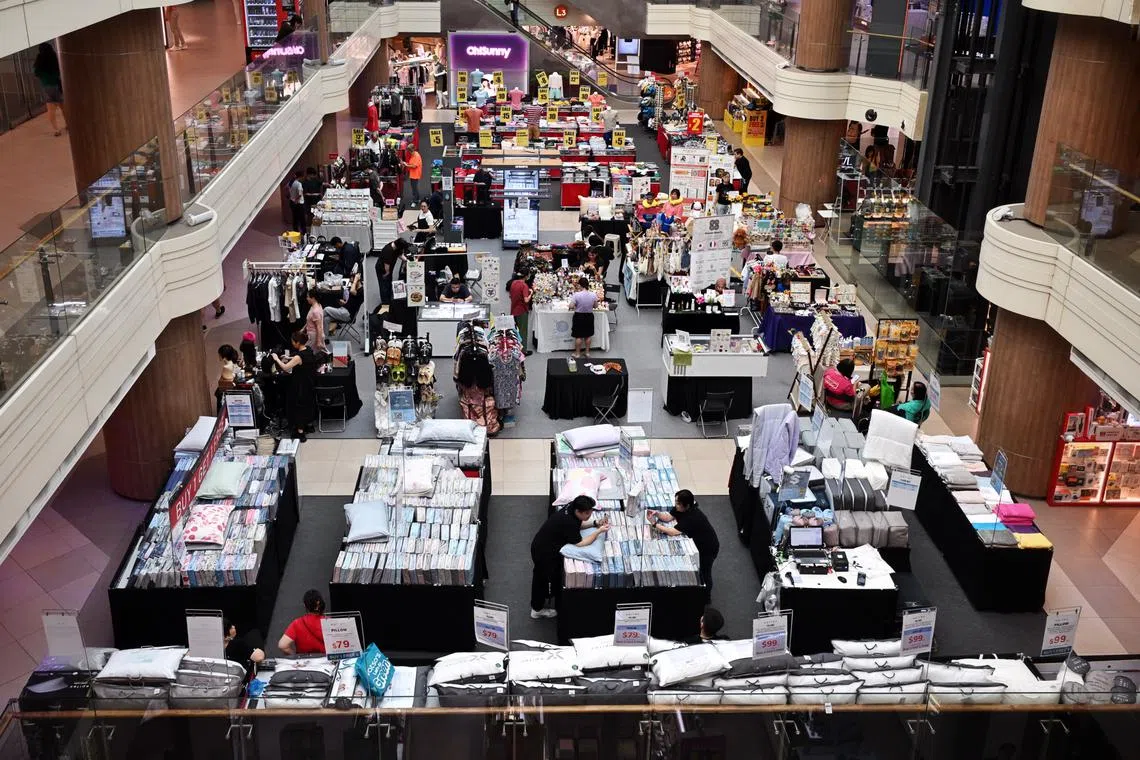Singapore retail sales up by 1.4%, driven by motor vehicle sales
Sign up now: Get ST's newsletters delivered to your inbox

More economic uncertainty could lead to further dampened retail sales in Singapore.
ST PHOTO: KUA CHEE SIONG
SINGAPORE - Retail sales here rose in May, maintaining low single-digit growth for the third consecutive month due to elevated economic uncertainty.
On a year-on-year basis, retail sales rose 1.4 per cent in May on the back of a 0.2 per cent growth in April, according to figures released by the Singapore Department of Statistics on July 4.
Excluding motor vehicles, retail sales registered flat growth in May, compared with the 0.8 per cent growth in April.
On a seasonally adjusted basis, retail sales rose 1 per cent in May over the previous month, with the increase mainly attributed to higher motor vehicle sales, which rose by 11.9 per cent.
Excluding motor vehicles, seasonally adjusted retail sales decreased 0.6 per cent, compared with April.
The estimated total retail sales value in May was $4.2 billion. Of this, an estimated 12.3 per cent was from online retail sales, compared with the 12.7 per cent recorded in April.
Within the retail trade sector, performance was mixed, with less than half of the sector areas recording an increase in sales. Sales of motor vehicles rose 10.4 per cent on a year-on-year basis in May, likely contributed to by the increase in certificate of entitlement quota.
The computer and telecommunications equipment industry and the supermarkets and hypermarkets industry recorded year-on-year sales growth of 9.2 per cent and 7.2 per cent, respectively.
In contrast, petrol service stations recorded a year-on-year decline of 9.4 per cent in May, while retailers of apparel and footwear recorded a decline of 5.3 per cent.
“We continue to foresee muted prospects for Singapore’s retail sales over the coming months, with downside risks stemming from elevated economic uncertainty,” said DBS economist Chua Han Teng.
Weaker domestic labour market conditions have the potential to further dampen consumer spending, as households could tighten their budgets in these uncertain times, he said.
Other factors that could affect retail sales include heightened global trade policy uncertainty and higher global trade frictions, which will negatively impact Singapore’s export-reliant economy, particularly in the second half of 2025, said Mr Chua.
Businesses remain measured in their hiring intentions for the third quarter of 2025, as indicated in the Ministry of Manpower’s (MOM) labour market report for the first quarter of the year, which would also see only moderate wage increases, Mr Chua said.
He added that a still-strong Singapore dollar would motivate locals to divert spending abroad in search of value products.
Excluding motor vehicles, the total retail sales value was about $3.6 billion, of which 14.5 per cent was from online retail sales.
Online retail sales made up 50.4 per cent of the total sales of computer and telecommunications equipment, 30 per cent for furniture and household equipment, and 11.9 per cent for the supermarkets and hypermarkets industry.
Food and beverage sales increased 1.4 per cent in May on a year-on-year basis, extending the 1.3 per cent growth seen in April.
On a seasonally adjusted basis, sales of food and beverage services rose 1.2 per cent in May compared with April. The total sales value of food and beverage services in May was estimated at $1 billion. Of this, an estimated 25.2 per cent was from online sales, lower than the 26 per cent recorded in April.
Within the food and beverage services sector, food caterers registered a growth in sales of 17.2 per cent. Turnover of cafes, foodcourts and other eating places rose 2.8 per cent, while that of fast-food outlets rose by 1.3 per cent during this period.
In contrast, the turnover of restaurants fell 4.2 per cent in May.
Retail sales are likely to remain tepid for the rest of 2025 alongside a gradually cooling labour market, said UOB economist Jester Koh. This is with MOM polls conducted in April and May indicating a decrease in the proportion of firms with the intention to raise wages, he said.
However, he added that measures in Budget 2025, such as CDC and SG60 vouchers, could lend some support to retail sales activity.


